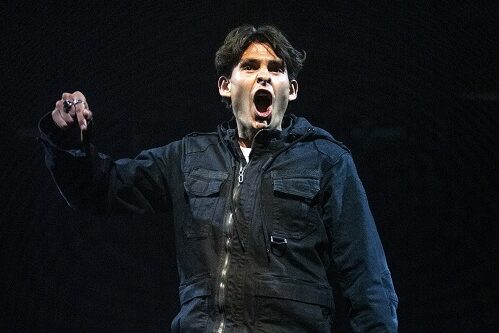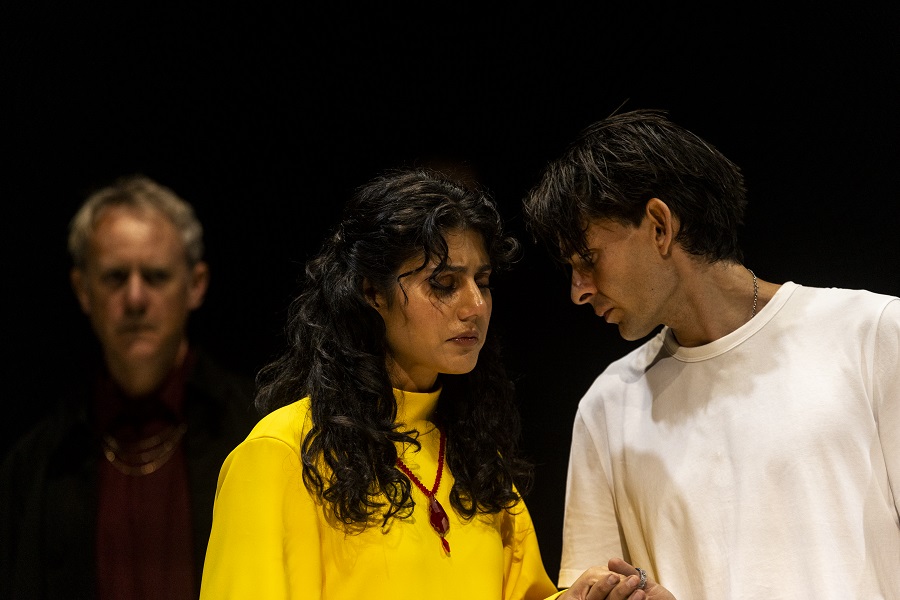Theatre / Henry 5, by William Shakespeare, directed by Marion Potts, Bell Shakespeare. At The Playhouse, until April 20. Reviewed by JOE WOODWARD.
At twenty-nine years of age, Henry of Monmouth, achieved one of the greatest military victories of all time. Now Henry 5, he led the small remnants of his English army to victory at Agincourt; cementing the key element of Shakespeare’s play Henry 5.
While it would be harsh to call Henry 5 a propaganda play, Shakespeare’s extolling of god’s will for England is perhaps in parallel with Frank Capra’s film making during World War 2 in support of the US war effort.
Yet to make the play work effectively the actors need to really engage with the audience so as to have them recognise the currency of situations being portrayed. This was very evident in the performances, especially in the presentation of the prologues and final epilogue. It was almost conversational and not heavy handed and lofty in tone.

JK Kazzi’s King Henry was the youthful pivot for such engagement. He is the kind of actor who can spin emotion on a sixpence with an effortless flow. His friendly smile easily transformed into a snake-like hiss evoking terror around him. His transitions from vulnerable moments of doubt to rock solid certainty became most evident in the Saint Crispin speech.
No longer proffered in that hammy politician-speak so prevalent in Shakespeare presentations, Kazzi merged his sense of vulnerability tinged with steely determination into a speech capable of connecting personally with each person around him. This was not the bloated speech of the egoist but rather a genuine standing on a line that nothing could really destroy.
This interpretation most likely will not appeal to staunch lovers of more traditional ego-based portrayals. Yet it fitted very well within the overall construction of the production.
All cast members tended to support the outward-reaching style engendered by Marion Potts’ direction. However, Ella Prince’s portrayal of Exeter was an exemplary example of an outwardly focused performance. The actor’s presentation of a prologue monologue lost all sense of a recitation and became simply part of a wider connecting chat with us. The interactions with every character and every nuanced silent reaction were masterful and ought to be studied by all young, would-be actors.

A star of the production was clearly the set and the way actors engaged physically with its possibilities and changes. Anna Tregloan’s very unusual stage setting allowed for maximum effective physical engagement with Nigel Poulton’s movement direction.
The cold metallic structures heightened by Verity Hampson’s lighting design provided for an unsettling after-image of steel brutality. Jethro Woodward’s sound design played the scene like the bass player to the lighting and sound’s rock beat. Design and performance merged brilliantly to construct many layers of meaning and potential interpretations.
There is one issue that I think goes back to Shakespeare; but Act 5 felt more like an extended postscript than a concluding act for the play. While Ava Madon’s performance of Katherine was powerful, the flippant nature of the scene seemed almost like a panto and bleeding much of the preceding power of the work.
I wonder why the ultimate marriage couldn’t simply be shown in a more concise way or included in the epilogue. While Henry’s ill-at-ease clowning in the face of Katherine’s rejection was fun to watch, and I notice that most commentators have tended to applaud the lighter ending, this change in style and approach undermined the very real power for the previous four acts.
Who can be trusted?
In a world of spin and confusion, there’s never been a more important time to support independent journalism in Canberra.
If you trust our work online and want to enforce the power of independent voices, I invite you to make a small contribution.
Every dollar of support is invested back into our journalism to help keep citynews.com.au strong and free.
Thank you,
Ian Meikle, editor





